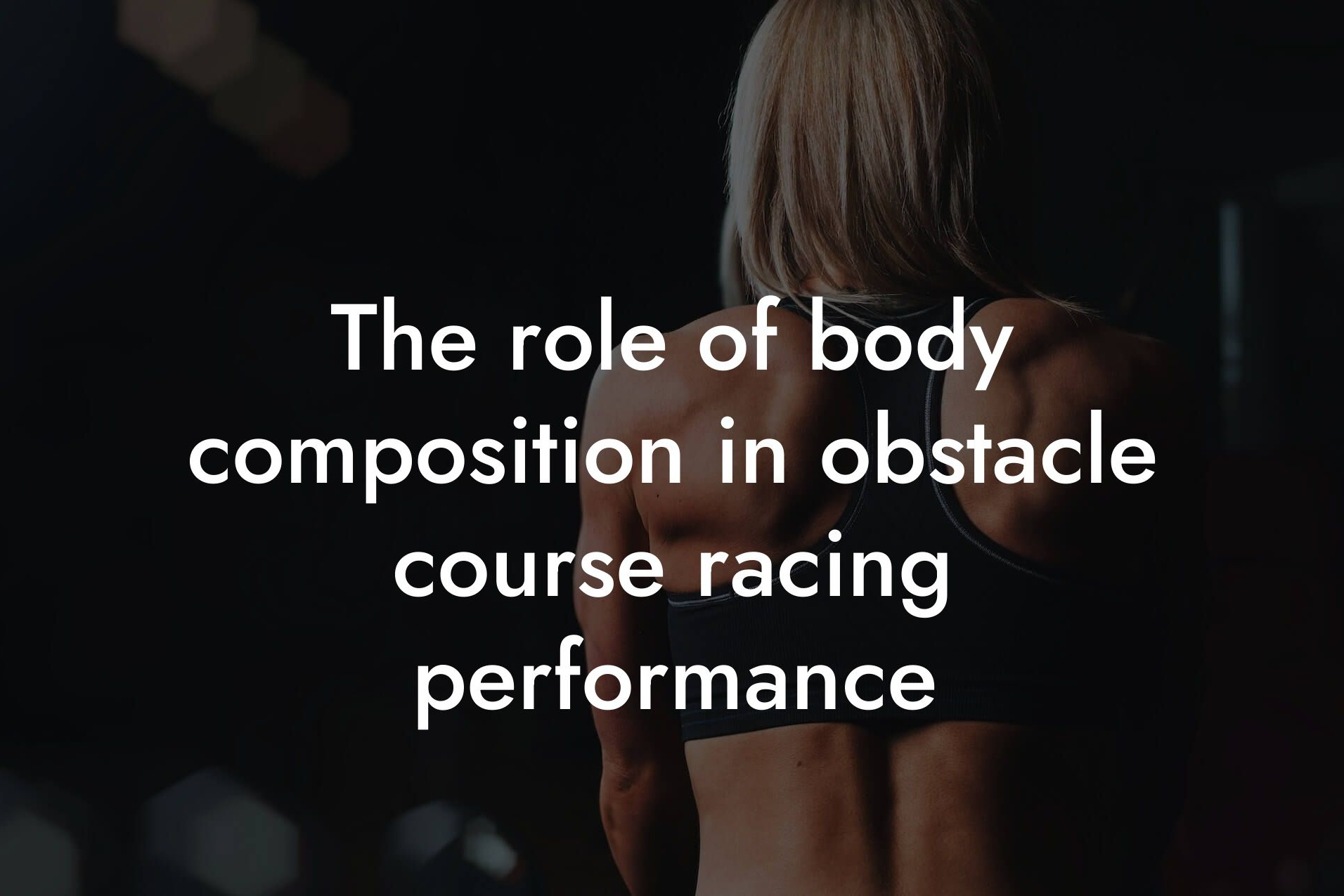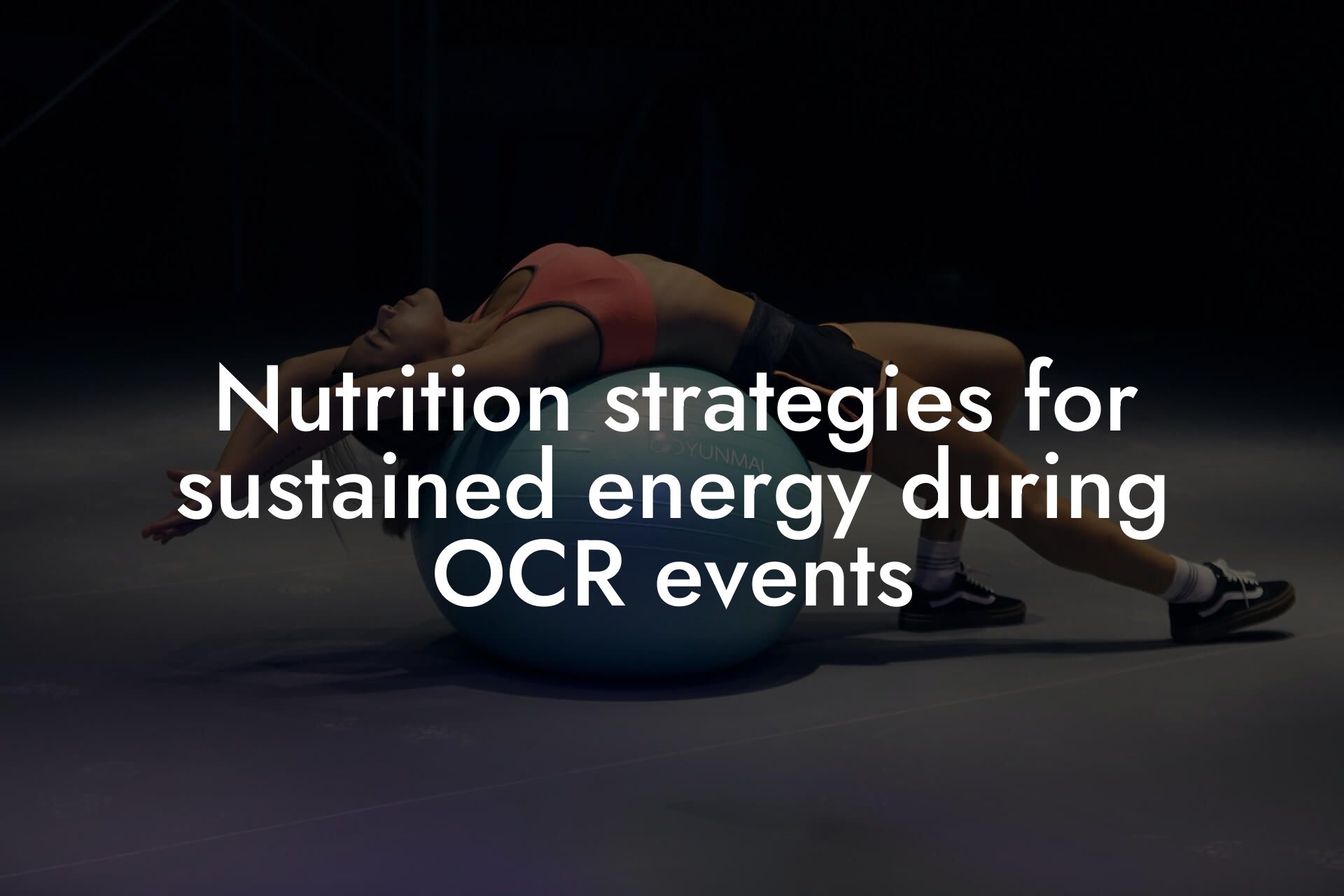As an obstacle course racing (OCR) athlete, you know that having a lean and athletic physique is crucial for optimal performance. Excess body fat can hinder your speed, agility, and overall endurance, making it more challenging to tackle obstacles and complete courses efficiently. At Tano Performance Group, we understand the importance of body composition for high-earning professionals like yourself, and we're here to guide you on how to reduce body fat for better OCR performance.
Table of Contents
What is a Healthy Body Fat Percentage for OCR Athletes?
For OCR athletes, a healthy body fat percentage ranges from 10-15% for men and 15-20% for women. Having a body fat percentage within this range allows for optimal power-to-weight ratio, improved agility, and enhanced endurance. However, it's essential to note that body fat percentage is just one aspect of overall health and fitness. A comprehensive body assessment, such as the one provided by our DEXA machine, can give you a more accurate picture of your body composition and help you identify areas for improvement.
The Impact of Excess Body Fat on OCR Performance
Carrying excess body fat can significantly impair your OCR performance in several ways:
1. Reduced Speed and Agility: Excess body fat increases your overall weight, making it more challenging to move quickly and efficiently through obstacles.
2. Decreased Endurance: Excess body fat requires more oxygen and energy to move, leading to fatigue and decreased endurance during long courses.
3. Increased Risk of Injury: Excess body fat can put additional stress on your joints, increasing the risk of injury and prolonged recovery times.
Nutrition Strategies for Reducing Body Fat
To reduce body fat, you need to focus on creating a calorie deficit while still providing your body with the necessary nutrients for optimal performance. Here are some evidence-based nutrition strategies to help you achieve your goal:
1. Macro-Nutrient Balance: Aim for a balanced diet consisting of 15-20% protein, 25-30% fat, and 55-60% carbohydrates. This balance will help you maintain muscle mass while reducing body fat.
2. Caloric Deficit: Create a daily caloric deficit of 500-750 calories to promote weight loss while preserving muscle mass. This can be achieved through a combination of reducing daily caloric intake and increasing energy expenditure through exercise.
3. Hydration and Electrolyte Balance: Adequate hydration and electrolyte balance are crucial for optimal performance. Aim to drink at least 8-10 glasses of water per day and consume electrolyte-rich foods or supplements to maintain optimal levels.
Training Strategies for Reducing Body Fat
In addition to nutrition, a well-structured training program can help you reduce body fat and improve OCR performance. Here are some training strategies to incorporate into your routine:
1. High-Intensity Interval Training (HIIT): Incorporate HIIT workouts 2-3 times per week to improve cardiovascular fitness, increase caloric expenditure, and enhance fat loss.
2. Strength Training: Incorporate strength training exercises 2-3 times per week to build muscle mass, increase metabolism, and improve overall performance.
3. Endurance Training: Incorporate endurance training exercises such as cardio and hill sprints to improve cardiovascular fitness and increase caloric expenditure.
Supplementation for Body Fat Reduction
While nutrition and training are the foundation of body fat reduction, certain supplements can help support your goals. Here are some evidence-based supplements to consider:
1. Conjugated Linoleic Acid (CLA): CLA has been shown to reduce body fat by inhibiting the enzyme lipase, which breaks down fat for energy.
2. Green Tea Extract: Green tea extract contains catechins, which can increase metabolism and enhance fat loss.
3. Protein Powder: A high-quality protein powder can help support muscle growth and repair, making it an essential supplement for OCR athletes.
Monitoring Progress and Adjusting Your Strategy
To ensure you're on track to reducing body fat and improving OCR performance, it's essential to monitor your progress regularly. Here are some metrics to track:
1. Body Fat Percentage: Use a DEXA machine or skinfold calipers to track changes in body fat percentage.
2. Weight and Body Composition: Track changes in weight, muscle mass, and body fat mass to ensure you're losing fat and preserving muscle.
3. Performance Metrics: Track changes in performance metrics such as completion time, obstacle completion rate, and overall endurance.
Reducing body fat is a crucial aspect of improving OCR performance. By incorporating evidence-based nutrition and training strategies, monitoring progress, and making adjustments as needed, you can achieve your goals and take your OCR performance to the next level. At Tano Performance Group, we're committed to helping high-earning professionals like yourself achieve optimal body composition and performance. Contact us today to learn more about our comprehensive body assessment services and how we can help you achieve your goals.
Frequently Asked Questions
What is the ideal body fat percentage for OCR athletes?
For OCR athletes, the ideal body fat percentage varies depending on individual goals and performance levels. Generally, a body fat percentage between 10-15% for men and 15-20% for women is considered optimal for OCR performance. However, it's essential to note that this can vary depending on factors such as age, muscle mass, and overall health.
Why is reducing body fat important for OCR performance?
Reducing body fat is crucial for OCR performance because it improves power-to-weight ratio, increases speed and agility, and enhances overall endurance. Excess body fat can hinder performance by increasing energy expenditure, reducing mobility, and increasing the risk of injury.
How does body fat affect OCR performance?
Body fat can negatively impact OCR performance in several ways. It can increase energy expenditure, reduce speed and agility, and decrease overall endurance. Additionally, excess body fat can lead to increased fatigue, reduced mobility, and a higher risk of injury.
What are the health risks associated with high body fat percentage?
A high body fat percentage is linked to various health risks, including increased risk of chronic diseases such as heart disease, type 2 diabetes, and certain types of cancer. Additionally, high body fat percentage can lead to joint problems, sleep apnea, and mental health issues.
How do I measure my body fat percentage?
There are several ways to measure body fat percentage, including dual-energy X-ray absorptiometry (DXA), skinfold measurements, bioelectrical impedance analysis (BIA), and hydrostatic weighing. It's essential to consult with a healthcare professional or registered dietitian to determine the most accurate method for your individual needs.
What is the best diet for reducing body fat for OCR athletes?
A well-balanced diet that focuses on whole, nutrient-dense foods such as lean proteins, complex carbohydrates, and healthy fats is ideal for reducing body fat for OCR athletes. Aim to create a calorie deficit by consuming fewer calories than you burn, while ensuring adequate nutrient intake to support performance and recovery.
How many calories should I consume daily to reduce body fat for OCR performance?
The daily calorie intake required to reduce body fat for OCR performance varies depending on individual factors such as age, sex, weight, and activity level. Aim to create a calorie deficit of 500-1000 calories per day through a combination of diet and exercise to promote weight loss and fat reduction.
What are the best exercises for reducing body fat for OCR athletes?
A combination of resistance training and high-intensity interval training (HIIT) is effective for reducing body fat for OCR athletes. Focus on exercises that target multiple muscle groups, such as squats, lunges, push-ups, and rows, and incorporate HIIT workouts that simulate OCR obstacles and challenges.
How often should I exercise to reduce body fat for OCR performance?
Aim to exercise at least 3-4 times per week, with a combination of resistance training and HIIT workouts. Additionally, incorporate active recovery days, such as yoga or light cardio, to aid in recovery and reduce the risk of injury.
Can I reduce body fat through diet alone?
While diet plays a significant role in reducing body fat, it's unlikely to achieve significant fat loss through diet alone. A combination of a well-balanced diet and regular exercise is essential for reducing body fat and improving OCR performance.
How long does it take to notice improvements in body fat percentage?
The time it takes to notice improvements in body fat percentage varies depending on individual factors such as starting point, diet, and exercise habits. Generally, it can take 4-6 weeks to notice significant improvements in body fat percentage, but it's essential to be patient and consistent with your training and nutrition plan.
What are the benefits of reducing body fat for OCR athletes?
Reducing body fat can improve OCR performance by increasing speed, agility, and endurance. Additionally, it can reduce the risk of injury, improve overall health, and enhance mental well-being.
How does reducing body fat affect mental performance?
Reducing body fat can have a positive impact on mental performance by increasing confidence, reducing anxiety and depression, and improving overall mental well-being. Additionally, achieving a leaner physique can enhance body image and self-esteem.
Can I reduce body fat too quickly?
Yes, reducing body fat too quickly can be detrimental to overall health and performance. Aim to lose 1-2 pounds per week for a sustainable and healthy rate of fat loss.
How does reducing body fat affect bone density?
Reducing body fat can have a positive impact on bone density, particularly in older adults. However, it's essential to ensure adequate calcium and vitamin D intake to support bone health.
What are the best supplements for reducing body fat for OCR athletes?
Certain supplements such as protein powder, creatine, and beta-alanine can be beneficial for reducing body fat and improving OCR performance. However, it's essential to consult with a healthcare professional or registered dietitian to determine the most effective supplements for your individual needs.
How does reducing body fat affect sleep quality?
Reducing body fat can improve sleep quality by reducing inflammation, improving insulin sensitivity, and enhancing overall health. Additionally, a leaner physique can reduce the risk of sleep apnea and other sleep disorders.
Can I reduce body fat without losing muscle mass?
Yes, it's possible to reduce body fat without losing muscle mass by focusing on a well-balanced diet and resistance training exercises. Aim to create a calorie deficit while maintaining adequate protein intake to support muscle growth and repair.
How does reducing body fat affect overall health?
Reducing body fat can have a positive impact on overall health by reducing the risk of chronic diseases, improving insulin sensitivity, and enhancing mental well-being. Additionally, a leaner physique can reduce the risk of joint problems and improve overall mobility.
What are the common mistakes OCR athletes make when trying to reduce body fat?
Common mistakes OCR athletes make when trying to reduce body fat include inadequate nutrition planning, overtraining, and unrealistic expectations. It's essential to consult with a healthcare professional or registered dietitian to develop a personalized training and nutrition plan.
How can I maintain my body fat percentage once I've reached my goal?
Maintaining a healthy body fat percentage requires a long-term commitment to a well-balanced diet and regular exercise. Aim to make sustainable lifestyle changes that promote overall health and well-being, rather than relying on fad diets or quick fixes.
What are the benefits of working with a registered dietitian or healthcare professional to reduce body fat?
Working with a registered dietitian or healthcare professional can provide personalized guidance and support to help OCR athletes achieve their body fat reduction goals. They can help develop a tailored training and nutrition plan that meets individual needs and promotes overall health and well-being.
Here are some related articles you might love...
- The role of body composition in obstacle course racing performance
- Strength training tips specific to obstacle course racing
- Nutrition strategies for sustained energy during OCR events
- The importance of bone density in OCR performance
- Preventing injuries in obstacle course racing: A comprehensive guide
- Improving agility and strength for obstacle course racing
- Balancing strength, speed, and endurance in OCR training
- Maintaining muscle recovery with OCR training
- Using DEXA scans to monitor progress in obstacle course training
Zak Faulkner
Zak Faulkner is a leading authority in the realm of physical health and body composition analysis, with over 15 years of experience helping professionals optimise their fitness and well-being. As one the experts behind Tano Performance Group, Zak has dedicated his career to providing in-depth, science-backed insights that empower clients to elevate their physical performance and overall health.
With extensive knowledge of DEXA technology, Zak specializes in delivering comprehensive body assessments that offer precise data on body fat, muscle mass, bone density, and overall physique. His expertise enables individuals to make informed decisions and achieve their fitness goals with accuracy and confidence. Zak’s approach is rooted in a deep understanding of human physiology, combined with a passion for helping clients unlock their full potential through personalised strategies.
Over the years, Zak has earned a reputation for his commitment to excellence, precision, and client-focused service. His guidance is trusted by top professionals who demand the best when it comes to their health. Whether advising on fitness programs, nutritional strategies, or long-term wellness plans, Zak Faulkner’s insights are a valuable resource for anyone serious about taking their health and fitness to the next level.
At Tano Performance Group, Zak continues to lead our Content Team revolutionising how professionals approach their physical health, offering unparalleled expertise that drives real results.




